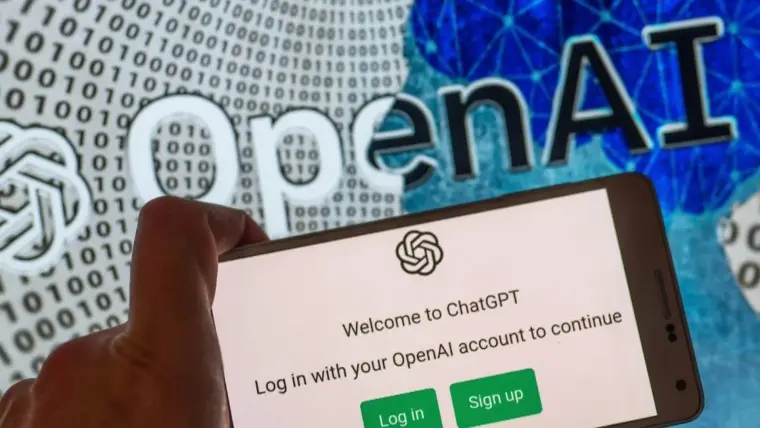
Job boards show employers hiring more roles linked to ChatGPT and other AI tools
Serge Osaulenko recently created a job posting for his brokerage, Everlane Realty, using ChatGPT. The role: a real estate agent who will also use ChatGPT for daily tasks.
“Not every agent is good at writing property descriptions,” said Osaulenko, but he expects ChatGPT will help change that.
Osaulenko, who is based in St. Petersburg, Florida, is among the growing number of employers seeking new hires who can use artificial intelligence technology in their daily job functions — or at least be willing to give it a try.
When the software maker OpenAI launched ChatGPT in November, it kicked off an arms race of investment and rivalry, along with debates from the ethical and the philosophical to the geopolitical. Rather than wait to see how they shake out, some employers are racing to advertise roles that interact with AI.
LinkedIn postings mentioning “GPT” — or “generative processing transformer,” a technical term for AI-driven tools that produce written content on command — ballooned by 51% from 2021 to 2022, according to data the company provided.
The employment website Indeed said it saw a more than 140% jump in mentions of “language model,” another term related to AI writing systems, across its job postings from February 2020 to last month.
The postings are some of the earliest signs of how an influx of AI tools could change potentially millions of people’s jobs. A study released this month by OpenAI and University of Pennsylvania researchers found that 80% of the U.S. workforce could have at least 10% of their work affected by GPTs and that nearly one-fifth could have half of their tasks affected.
When Osaulenko tested ChatGPT a few months ago, he said, all he had to do was enter a property’s address to generate an almost-ready-to-publish description for a home listing — complete with acreage, square footage and the number of bedrooms and bathrooms.
Include with your application a ChatGPT-generated story a 7-year-old might enjoy, and the prompt you used to generate it.
— A sample candidate assessment posted on ziprecruiter
Since then, he has started using AI tools to help with writing blog posts and scripts for marketing content to cutting videos and more. He said he wants the next real estate agent he hires to learn to do the same.
AI-related tasks are becoming embedded in a small but growing number of jobs that aren’t directly tied to tech functions, ZipRecruiter Chief Economist Julia Pollak said. About half the platform’s listings that mention ChatGPT are for AI-related engineering positions, she said, while the other half are skewed toward marketing or content generation.
Pollak said the second type of listing typically seeks candidates with the “willingness to learn and adapt to new technologies, e.g. ChatGPT,” or says, “You are excited to figure out how we can use ChatGPT and other AI tools to do work better and faster.”
That suggests enthusiasm to experiment with such tools is as much a qualification as technical knowledge — hardly a surprise given that ChatGPT’s user-friendly design operates on plain language commands rather than code.
AI 101: See what artificial intelligence can -- and can't do
March 22, 202306:48“It is also being used in job candidate skills assessments,” Pollak said, with recent prompts on ZipRecruiter asking applicants to “describe how you think tools like ChatGPT might affect your role over time” or to “include with your application a ChatGPT-generated story a 7-year-old might enjoy, and the prompt you used to generate it.”
Nation, a New York-based business that operates a fundraising platform, was recently hiring for a marketing leader who has “already begun experimenting with generative AI” and is excited to grow and scale using AI tools.
Almost every employee at the 11-person tech company has already been using ChatGPT at least weekly since the end of January, founder Ryan Shea said. It isn’t perfect, and it doesn’t replace “knowledge workers,” he said, but it can aid the creative process.
“It’s the technological story as old as time,” he said. “If you were a horse buggy driver and you didn’t embrace cars, things didn’t work out for you.”
Some schools have already banned ChatGPT from classrooms over cheating concerns, while some others are embracing it. A handful of recent job postings for history and philosophy instructors in the New York area say teachers will use ChatGPT as a learning tool for secondary and high school students.
Wellput, an email marketing company, is looking for an ad sales coordinator who will use AI programs like ChatGPT or Jasper.ai to draft templates for use in email campaigns, among other tasks. The company said it has been using the tools for about three months.
There’s no guarantee the enthusiasm will keep climbing. OpenAI this month released GPT-4, its latest iteration, drawing concerns that have added to a rising chorus of AI experts and ethicists who are calling for greater regulation and controls as the technology barrels ahead.
Recent history shows some buzzy tech can trigger a hiring frenzy that fizzles out. After they surged last year in a flurry of media coverage, mentions of NFTs in job postings on Indeed peaked at 226 per million listings in April, according to data provided by the platform, before they fell to single digits in December as the market for nonfungible tokens faded.
From February 2022 to last month, NFT-related listings on Indeed fell by 64%.
“Some people are going to call it gimmicky and [say] this is not going to last,” Osaulenko said of the emerging AI tools. But he remains bullish, comparing their impact to the advent of the internet itself.







